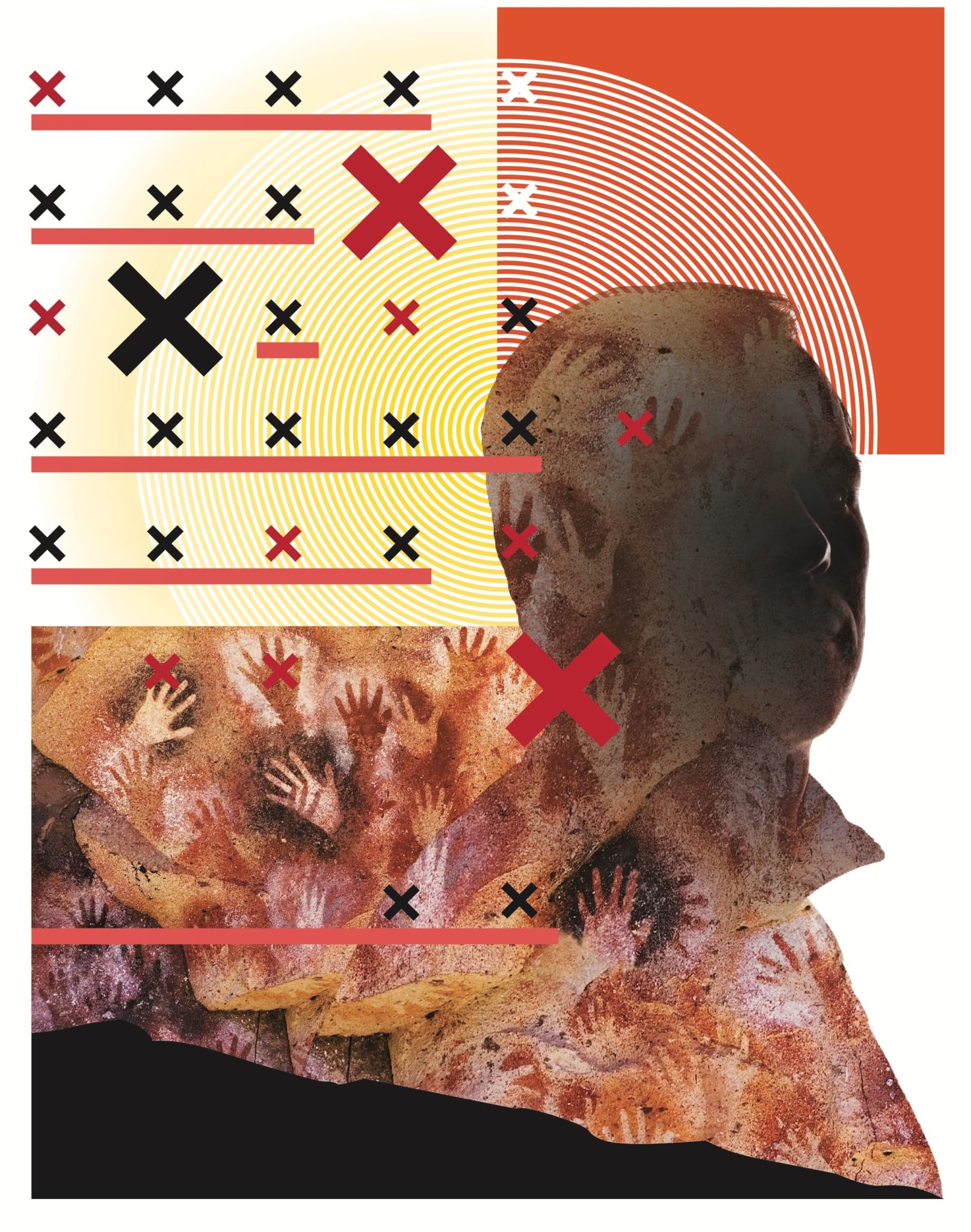Can evolutionary psychology untangle the roots of sexual conflict?
IN MARCH, FACING MULTIPLE COMPLAINTS of sexual harassment, New York’s three-term Democratic governor, Andrew Cuomo, issued an apology. “I never knew at the time that I was making anyone feel uncomfortable,” he said. “I never, ever meant to offend anyone or hurt anyone or cause anyone pain.”
To many, the apology seemed only to underline Cuomo’s cluelessness—or disingenuousness. How could he not have known that sexually charged conversations with subordinates, some of them young enough to be his grandchildren, were bound to offend?
Evolutionary psychologist and Berkeley Ph.D. grad David M. Buss has some answers.
“One of the pioneers of evolutionary psychology, David Buss lays out a theory of sexual conflict between men and women involving a co-evolutionary arms race.”
“On average, men find women more attractive than women find men,” says Buss, 68, professor of psychology at the University of Texas at Austin. Studies also have found that men tend to prefer women younger than themselves—and, as they grow older, their preferred age gap increases. Men in this situation tend to commit “mind-reading errors,” Buss says, finding it “unfathomable that the woman is not also attracted to them.” A male “sexual over-perception bias” could have led Cuomo to mistake a friendly or ambiguous signal, such as a smile, for sexual receptiveness.
“Not all men are equally susceptible to the sexual over-perception bias,” Buss adds. “What we found in our lab study is that men who are most inclined to do this are high in narcissism.” Other research shows that men with status or wealth “feel a sense of entitlement,” and “have this psychological proclivity to feel that the rules are made for other people, not for them,” he says. In other words: When you’re a star, they let you do it.
One of the pioneers of evolutionary psychology, Buss details these ideas in a new, ripped-from-the-headlines book, When Men Behave Badly: The Hidden Roots of Sexual Deception, Harassment, and Assault (Little, Brown Spark). Juxtaposing more than three decades of laboratory research with case studies from the animal kingdom, hunter-gatherer societies, and the Wild West of internet dating, he lays out a theory of sexual conflict between men and women involving a co-evolutionary arms race.
Evolutionary psychologists maintain that natural selection and sexual selection have favored specific traits and tendencies. One of the discipline’s core tenets is that reproductive biology has given rise to psychological differences between men and women—such as the male desire for sexual variety and the female preference for long-term commitment—that enhance mating success. Conflicts naturally arise because what is good for women is not always good for men, and vice versa.
Our modern cultural environment may have exacerbated these conflicts, Buss argues, leading to widespread sexual harassment, stalking, assault, and rape—patterns of conduct that the #MeToo movement and societies around the world have only just begun to confront. But Buss notes that he has been studying these issues for years. “The cultural zeitgeist happens to be coinciding with my work,” he says.
With its emphasis on human universals, evolutionary psychology has long been criticized for downplaying the role of culture, or for failing to disentangle culture and biology. Feminists have taken the discipline to task for what they see as an endorsement of gender-based distinctions and a sexist status quo. And there remain strong academic currents of what Buss calls “sex difference denialism,” exemplified by books such Gina Rippon’s Gender and Our Brains: How New Neuroscience Explodes the Myths of the Male and Female Minds (2019), which emphasizes brain plasticity, and Cordelia Fine’s Testosterone Rex: Myths of Sex, Science, and Society (2017). Fine suggests that the social impact of overstating evolutionary differences is the denigration of women’s professional ambitions.
In this new book, his first in a decade, Buss confronts such criticisms directly, positing a complex relationship between patriarchal cultural institutions and evolved psychology. He also seeks to identify the personality types of men most likely to transgress against women. Far from endorsing the status quo, Buss writes that he hopes to raise consciousness and spur change, to “reduce the occurrence of sexual conflict and heal the harms it creates.”
IN THE EARLY 1970s and early 1980s, evolutionary psychology did not yet exist. “No one studied human mating strategies, and sex differences were believed to be trivial or nonexistent,” Buss wrote in a 2003 paper, “Sexual Strategies: A Journey into Controversy,” in the journal Psychological Inquiry. “If there was a nature to humans, according to mainstream assumptions, it was that humans had no fundamental nature. People were plastic, formless, passive receptacles whose adult form was achieved solely by input that occurred during development.”
Buss himself has been integral to changing these attitudes. “David is the world’s foremost researcher on the psychology of sexuality,” says Steven Pinker, the renowned Harvard professor and experimental cognitive psychologist. “He has a grasp of deep ideas from evolutionary biology, insight into human motives and emotions, ingenuity about research methods, and the right combination of moral seriousness and good-natured humor.”
Buss describes his own nature as rebellious. Born in Indianapolis, he moved repeatedly as a child—from Pittsburgh to northern New Jersey to Austin—each time his father, a psychology professor, switched jobs. His mother, a homemaker, worked with the NAACP to combat housing discrimination. Buss’s adolescence was bumpy. “My grades absolutely plummeted, in part because of the peer group that I got involved with,” he says. He dropped out of high school after two marijuana possession arrests (both times the charges were dropped) but earned a diploma at night school.
Matriculating at the University of Texas, he finally found his academic footing. He encountered evolutionary theory—“the first intellectual idea that mesmerized me,” he says—in a freshman geology class. His 1975 psychology term paper, “Dominance and Access to Women,” made the then-novel argument that men competed for status to gain sexual access to women.
At Berkeley, Buss focused on personality psychology. One of his mentors, Jeanne H. Block, was a leading exponent of the idea that sex differences were the result of socialization, not biology. But as an assistant professor at Harvard, Buss met others who shared his evolutionary outlook—including the husband-and-wife team of John Tooby and Leda Cosmides and the entomologist E.O. Wilson, author of the controversial 1975 book Sociobiology, which emphasized the biological roots of social behavior. Buss also incorporated into his lectures the ground-breaking 1970s work of the anthropologist Donald Symons, on the evolution of human sexuality, and the biologist Robert Trivers, on sexual selection and parental investment.
Buss came to believe, “that mating was the center of the psychological universe”—and that men and women had different sexual psychologies.
Buss’s breakthrough was a collaborative multiyear study of mating preferences, the International Mate Selection Project, encompassing 10,047 subjects from 37 cultures. (“My Nigerian colleague wished to know whether I sought mate preferences for a man’s first wife, second wife, or third wife,” Buss noted wryly in Psychological Inquiry.) Published in 1989, after Buss had moved to the University of Michigan, the study demonstrated that men universally valued youth and physical attractiveness in women—presumptive markers of fertility. Women, by contrast, sought long-term mates with high status and economic resources to provide for them and their offspring.
Buss came to believe, he wrote in Psychological Inquiry, “that mating was the center of the psychological universe”—and that men and women had different sexual psychologies. Over the years, he refined and expanded his theories, looking, for example, at the varied mating strategies—both long- and short-term—employed by men and women. Buss (who has taught at the University of Texas at Austin since 1996) has written several books for popular audiences: The Evolution of Desire, The Dangerous Passion (on jealousy), The Murderer Next Door (on homicide), and, with Cindy M. Meston, Why Women Have Sex. He also authored a textbook, Evolutionary Psychology: The New Science of the Mind, the first, and still the dominant text, in the field.
Buss’s research has given him insight into his own behavior, too. He describes himself as “basically, exclusively, a long-term mating guy”—divorced, with two children; widowed when his second wife died of cancer after a 20-year marriage, and now in a “very happy” more than eight-year-long partnership with another professor at the University of Texas at Austin.
“For much of my life, I’ve been very shy with women,” Buss reflects. Evolutionary psychology predicts that women will prefer self-confident men, since self-confidence is a cue to status. And as he attained professional success, Buss says, “I’ve shown more self-confidence in approaching women who strongly attract me.”
WHEN MEN BEHAVE BADLY IS, in part, the product of Buss’s growing consciousness of the prevalence and impact of sexual assault and harassment. So many women he knew “had been touched by sexual violence,” he says. “The range was tremendous, from mild to horrific. But I saw the psychological scars it created.”
Buss remembers a friend of his college girlfriend “sobbing hysterically about being sexually abused.” He heard a girlfriend consoling her best friend, who “screamed in rage and anguish for hours,” after being raped by two strangers. Yet another girlfriend told him she had been raped by someone she met in a bar. A former partner revealed a history of repeated rape that led to chronic “black hole” depression.
He recalls examples of sexual harassment as well: Four female graduate students complaining to their department chair about a male professor’s unwelcome advances. A graduate student told by an interviewer that he could not hire her “because he wanted to ask her out, and he couldn’t do so if she were in his employ.”
During Buss’s undergrad years, professors threw keg parties where teaching assistants would have “their arms draped around the undergraduates,” he says. And it was not unusual for professors themselves to sleep with undergraduates.
“I started talking to more and more women, some close female friends, some just women I knew. And many confided in me,” Buss says. “I started to realize how pervasive various forms of sexual violence were.” He published a 2011 paper, “The Costs of Rape,” examining its traumatic aftermath. “Even though I think of myself as empathic for a man,” he says, “I realized that, at some level, I had been clueless. And, undoubtedly, I still am clueless, since I don’t think it’s possible for a man to fully grasp how psychologically devastating these things are to women.”
WHEN HE FIRST CONCEIVED OF WRITING a book on sexual conflict, Buss figured he would try to be even-handed—to note, for example, that both men and women engage in tactics designed to enhance their mating prospects. Women’s efforts to avoid what Buss calls “subpar males” or their requirement of “extensive courtship displays before consenting to sex” have inspired male adaptations designed “to circumvent these barriers,” including lying about their income and their interest in commitment, he writes in When Men Behave Badly. Women, too, engage in deception—for instance, by under-reporting their weight or posting photoshopped or old pictures on dating sites, he says.
But the even-handedness Buss contemplated had its limits, he discovered. “When you get to sexual violence,” Buss says, “it is the case that men are primarily the perpetrators, and women are primarily the victims.” Predator-prey analogies, gleaned from the animal kingdom, are “disturbingly on point,” he writes, and help explain behavior such as sexual harassment, stalking, rape, and intimate partner violence.
Stalking and violence may arise from male jealousy, provoked by fears of sexual infidelity, mate defection, and paternity uncertainty. Studies have shown that female jealousy, by contrast, focuses more strongly on emotional infidelity, linked to the possibility of losing male investment in current or future offspring.
Another trigger of violent, controlling, or abusive behavior is what Buss calls “mate-value discrepancy,” which can be aggravated by changing circumstances. A man who loses his job, for example, might worry that his diminished resources would impel a partner to “mate switch”—that is, trade him in for a newer, more prosperous model.
One ongoing (if somewhat arcane) discussion within evolutionary psychology concerns whether men have evolved specific rape adaptations because sexual aggression results in more offspring. The alternative view is that rape is instead a byproduct of such factors as the male desire for sexual variety and low-investment sex. Parsing the evidence, Buss prefers the byproduct theory, and argues that rape could be reduced by “[a] diminution of patriarchal ideology, stronger enforceable laws, greater police sensitivity to victims of sex crimes, and a more educated populace.”
Throughout the book, Buss insists that evolutionary psychology should not be tarred by the so-called naturalistic fallacy, which confounds what is with what should be. “Adaptive … does not mean morally good,” he writes. “Identifying evolutionary origins of nefarious behavior in no way justifies or excuses it.”
Buss also aims to present a nuanced view of the relationship between culture and sexual psychology. The failure of patriarchal legal systems to recognize spousal rape, for example, is an artifact of “men with an evolved sexual psychology that prioritizes their rights,” he says. “Once those laws exist, though, they do exert a social pressure.” By the same token, changing legal and social norms can discourage patriarchal or sexist behavior.
In fact, human beings are intensely responsive to such factors as social reputation and group consensus, if only because reputation bears on mating success. (Accusations of sexual misconduct, one might recall, led to divorces for men such as the film producer Harvey Weinstein and former New York governor Eliot Spitzer.) “Sexual psychology gets played out in a social and cultural context,” Buss says, and contemporary developments such as the #MeToo movement are sending tremors through government, academe, Hollywood, publishing, and the rest of the culture.
Not all men, of course, are guilty of offensive conduct against women. To pinpoint those who are, Buss returns to personality theory and the research of Delroy L. Paulhus, professor of psychology at the University of British Columbia at Vancouver (who did a sabbatical at Berkeley). Paulhus has identified three subclinical personality types whom he calls the “Dark Triad”: men high in narcissism (marked by a sense of personal entitlement), Machiavellianism (the tendency to manipulate and exploit), and psychopathy (lack of empathy). In a 2002 paper with Kevin M. Williams, Paulhus called these “overlapping but distinct constructs.” (He and two collaborators have since added “everyday sadism,” making for a “Dark Tetrad.”)
In Buss’s view, it is Dark Triad men who are most apt to sexually harass, stalk, assault, and rape women. Geographic mobility and the potential for anonymity in urban settings have made Dark Triad personalities harder to detect and ostracize, Buss hypothesizes. And women living alone, lacking the “kin protection” of their hunter-gatherer ancestors, are more vulnerable to their predations. Modern life may be spawning an increase in “a psychopathic strategy,” Buss says. “It’s just easier for men to get away with deception,” and worse.
Buss says he used to consider himself a pure scientist, uninterested in applications of his work. But that has changed. “Over time,” he says, “I’ve actually realized that this work has profound implications for solving some real social problems, and I think sexual violence against women is … the most pervasive human rights problem in the world.” Not that scientific knowledge is “a magic bullet that’s going to cure everything. … [But] the assumption that male and female sexual psychologies are identical is a harmful position to take, given that we know that they are not.”
There are lessons in evolutionary psychology for both men and women, Buss suggests. Learning about such phenomena as “the male tendency to infer interest where there is none” can be helpful, he says. “It doesn’t necessarily mean you’re going to be able to prevent experiencing the bias, but you might be able to correct it.” (Andrew Cuomo, take note.)
“In an ideal world,” Buss adds, women would be free not to worry that certain behaviors, such as imbibing intoxicants or rejecting undesirable suitors, might subject them to male sexual aggression or coercion. But, in our world, he says, “not informing women about the circumstances in which they’re at risk is morally problematic, to put it mildly.”
Julia M. Klein, a cultural reporter and critic in Philadelphia, has written for the New York Times, Wall Street Journal, Los Angeles Times, Mother Jones, Slate, and other publications. Follow her on Twitter @JuliaMKlein.



















